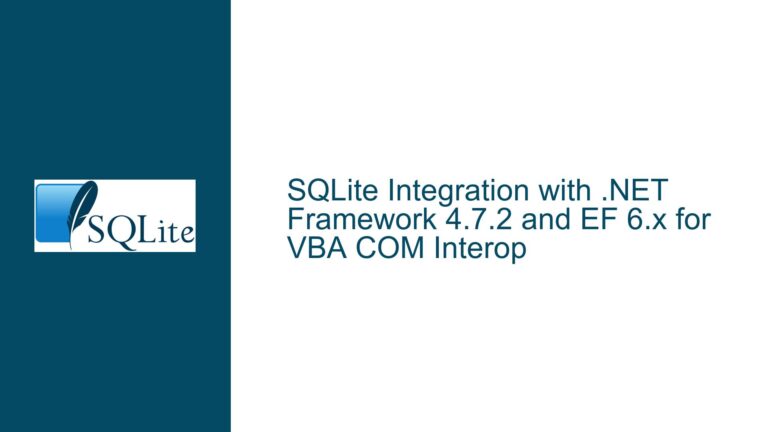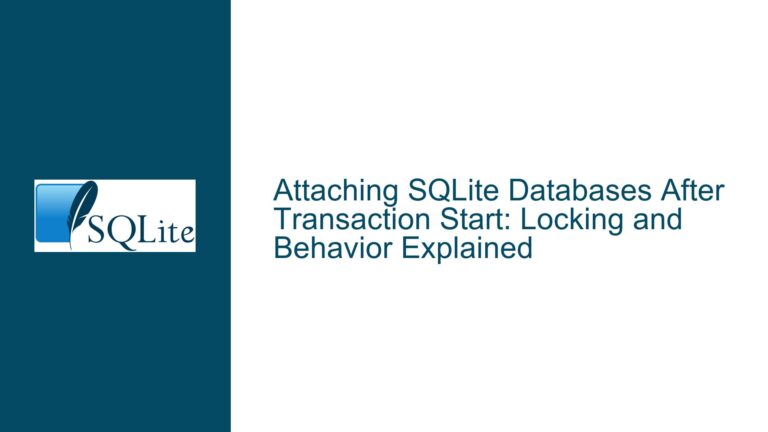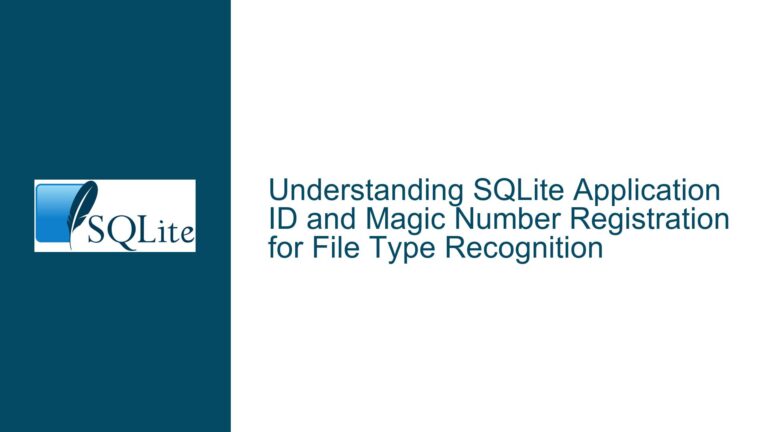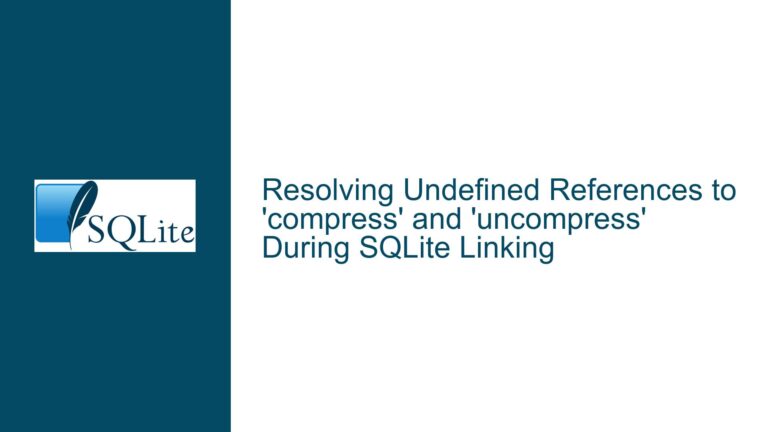Resolving SQLite REGEXP Extension Installation and Usage Issues
Understanding the SQLite REGEXP Extension and Its Availability
The SQLite REGEXP extension is a powerful tool that allows users to perform regular expression operations directly within SQLite queries. This functionality is not natively included in SQLite by default, which often leads to confusion among users who expect it to be readily available. The REGEXP operator, when enabled, can be used in SQL queries to match text against a regular expression pattern, providing a flexible way to filter and manipulate data.
The core issue revolves around the installation and availability of the REGEXP extension. Users often encounter difficulties when attempting to enable this feature, especially if they are not familiar with the underlying mechanisms required to make it work. The REGEXP extension relies on an external library, typically the Perl Compatible Regular Expressions (PCRE) library, to provide the necessary functionality. This dependency introduces additional steps in the setup process, which can be a source of frustration for users who are not well-versed in compiling and linking C code.
The discussion highlights a common scenario where users visit the official SQLite documentation page on expressions, specifically the section detailing the REGEXP operator. The documentation provides a link to further information on how to enable the REGEXP functionality, which often leads users down a path of learning how to compile C code and integrate the PCRE library with SQLite. This process can be daunting for those who are not experienced in software development, leading to a need for simpler solutions.
One such solution is the availability of precompiled packages that include the SQLite REGEXP extension. These packages, such as sqlite3-pcre, are often available in the repositories of various Linux distributions. By installing these packages, users can bypass the need to manually compile the extension and instead have it readily available for use in their SQLite environment. This approach significantly simplifies the process and makes the REGEXP functionality accessible to a broader audience.
However, the discussion also points out that mentioning the availability of such packages in the official documentation could be seen as off-topic. This raises an important consideration for documentation maintainers: how to balance providing comprehensive information with keeping the content focused and relevant. While the inclusion of package installation instructions might be beneficial for users, it could also detract from the primary purpose of the documentation, which is to explain the functionality and usage of SQLite features.
Identifying the Root Causes of REGEXP Extension Installation Challenges
The challenges associated with installing and enabling the SQLite REGEXP extension stem from several factors. First and foremost is the fact that SQLite is designed to be a lightweight, self-contained database engine. This design philosophy emphasizes simplicity and minimal dependencies, which means that advanced features like regular expression support are not included by default. Instead, these features are provided as optional extensions that users can enable if needed.
The reliance on an external library, such as PCRE, introduces additional complexity. Users must ensure that the library is installed on their system and that SQLite is configured to link against it. This process typically involves compiling SQLite from source with the appropriate flags to enable the REGEXP extension. For users who are not familiar with compiling software, this can be a significant barrier to entry.
Another contributing factor is the lack of clear, step-by-step instructions in the official documentation. While the documentation does provide information on how to enable the REGEXP extension, it assumes a certain level of technical proficiency. Users who are not experienced in compiling and linking C code may find the instructions difficult to follow, leading to frustration and confusion.
The availability of precompiled packages, such as sqlite3-pcre, offers a potential solution to these challenges. These packages are typically maintained by the community or distribution maintainers and provide a convenient way to install the REGEXP extension without the need for manual compilation. However, the availability of these packages can vary depending on the operating system and distribution, which may limit their usefulness for some users.
Finally, the discussion highlights the importance of considering the target audience when creating documentation. While advanced users may appreciate detailed instructions on compiling and linking the REGEXP extension, less experienced users may benefit more from information on how to install precompiled packages. Striking the right balance between these two approaches is crucial for ensuring that the documentation is accessible and useful to a wide range of users.
Step-by-Step Guide to Enabling and Using the SQLite REGEXP Extension
To address the challenges associated with enabling and using the SQLite REGEXP extension, the following step-by-step guide provides detailed instructions for both manual compilation and package installation. This guide aims to cater to users with varying levels of technical expertise, ensuring that everyone can successfully enable and use the REGEXP functionality in their SQLite environment.
Manual Compilation of the SQLite REGEXP Extension
For users who prefer to compile the REGEXP extension from source, the following steps outline the process:
Install the PCRE Library: Before compiling the REGEXP extension, ensure that the PCRE library is installed on your system. On most Linux distributions, this can be done using the package manager. For example, on Debian-based systems, you can install the library using the command
sudo apt-get install libpcre3-dev.Download the SQLite Source Code: Obtain the source code for SQLite from the official website. You can download the latest version from the SQLite download page.
Extract the Source Code: Once the source code is downloaded, extract it to a directory on your system. This can be done using the
tarcommand, for example:tar -xzvf sqlite-autoconf-*.tar.gz.Configure the Build Environment: Navigate to the directory where the source code was extracted and run the
configurescript. This script will prepare the build environment and check for the necessary dependencies. You can enable the REGEXP extension by specifying the--enable-regexpflag. For example:./configure --enable-regexp.Compile SQLite: After configuring the build environment, compile SQLite by running the
makecommand. This will generate the SQLite binary along with the REGEXP extension.Install SQLite: Once the compilation is complete, install SQLite by running
sudo make install. This will place the SQLite binary and the REGEXP extension in the appropriate directories on your system.Verify the Installation: To verify that the REGEXP extension is enabled, you can run the SQLite shell and execute a query that uses the REGEXP operator. For example:
sqlite3 test.db "SELECT 'hello' REGEXP '^h';". If the extension is correctly installed, this query should return1.
Installing the SQLite REGEXP Extension via Precompiled Packages
For users who prefer a simpler approach, precompiled packages such as sqlite3-pcre can be installed using the package manager. The following steps outline the process:
Check for Package Availability: First, check if the
sqlite3-pcrepackage is available in your distribution’s repository. On Debian-based systems, you can search for the package using the commandapt-cache search sqlite3-pcre.Install the Package: If the package is available, install it using the package manager. For example, on Debian-based systems, you can install the package using the command
sudo apt-get install sqlite3-pcre.Verify the Installation: After installing the package, verify that the REGEXP extension is available by running the SQLite shell and executing a query that uses the REGEXP operator. For example:
sqlite3 test.db "SELECT 'hello' REGEXP '^h';". If the extension is correctly installed, this query should return1.
Troubleshooting Common Issues
Despite following the above steps, users may encounter issues when attempting to enable or use the REGEXP extension. The following troubleshooting steps address some of the most common problems:
Missing PCRE Library: If the PCRE library is not installed on your system, the compilation process will fail. Ensure that the library is installed before attempting to compile SQLite. On Debian-based systems, you can install the library using the command
sudo apt-get install libpcre3-dev.Incorrect Configuration Flags: If the
--enable-regexpflag is not specified during the configuration step, the REGEXP extension will not be included in the compiled binary. Double-check the configuration command to ensure that the flag is present.Package Not Found: If the
sqlite3-pcrepackage is not available in your distribution’s repository, you may need to manually compile the REGEXP extension as described earlier. Alternatively, you can check if the package is available in a third-party repository or consider using a different distribution that includes the package.Permission Issues: If you encounter permission issues during the installation process, ensure that you have the necessary administrative privileges. On Linux systems, you can use the
sudocommand to execute commands with elevated privileges.Compatibility Issues: Ensure that the version of the PCRE library installed on your system is compatible with the version of SQLite you are using. Incompatibilities between versions can lead to compilation errors or runtime issues.
Testing the REGEXP Operator: If the REGEXP operator does not work as expected, test it with a simple query to ensure that the extension is correctly installed. For example, the query
SELECT 'hello' REGEXP '^h';should return1if the extension is functioning correctly.
Best Practices for Using the SQLite REGEXP Extension
Once the REGEXP extension is successfully enabled, it is important to follow best practices to ensure optimal performance and reliability. The following recommendations provide guidance on how to effectively use the REGEXP operator in SQLite queries:
Use Indexes Wisely: Regular expression operations can be computationally expensive, especially when applied to large datasets. To improve performance, consider using indexes on the columns that are frequently used in REGEXP operations. However, note that SQLite does not support indexing on REGEXP operations directly, so this approach may not always be feasible.
Optimize Regular Expressions: Write efficient regular expressions to minimize the computational overhead. Avoid using overly complex patterns or excessive backtracking, as these can significantly impact query performance.
Test Queries Thoroughly: Before deploying queries that use the REGEXP operator in a production environment, thoroughly test them to ensure that they produce the expected results. This is especially important when dealing with complex regular expressions or large datasets.
Consider Alternative Approaches: In some cases, it may be more efficient to use alternative approaches to achieve the same result as a REGEXP operation. For example, simple string matching operations using the
LIKEoperator may be sufficient for certain use cases and can be more performant.Monitor Performance: Regularly monitor the performance of queries that use the REGEXP operator, especially in high-traffic environments. If performance issues arise, consider optimizing the queries or revisiting the database schema to better support the required operations.
Stay Updated: Keep SQLite and the REGEXP extension up to date to benefit from the latest performance improvements and bug fixes. Regularly check for updates to the PCRE library as well, as these can impact the functionality and performance of the REGEXP extension.
By following these best practices, users can maximize the benefits of the SQLite REGEXP extension while minimizing potential issues. Whether you choose to compile the extension from source or install it via a precompiled package, understanding the underlying mechanisms and adhering to best practices will ensure a smooth and efficient experience with SQLite’s regular expression capabilities.






